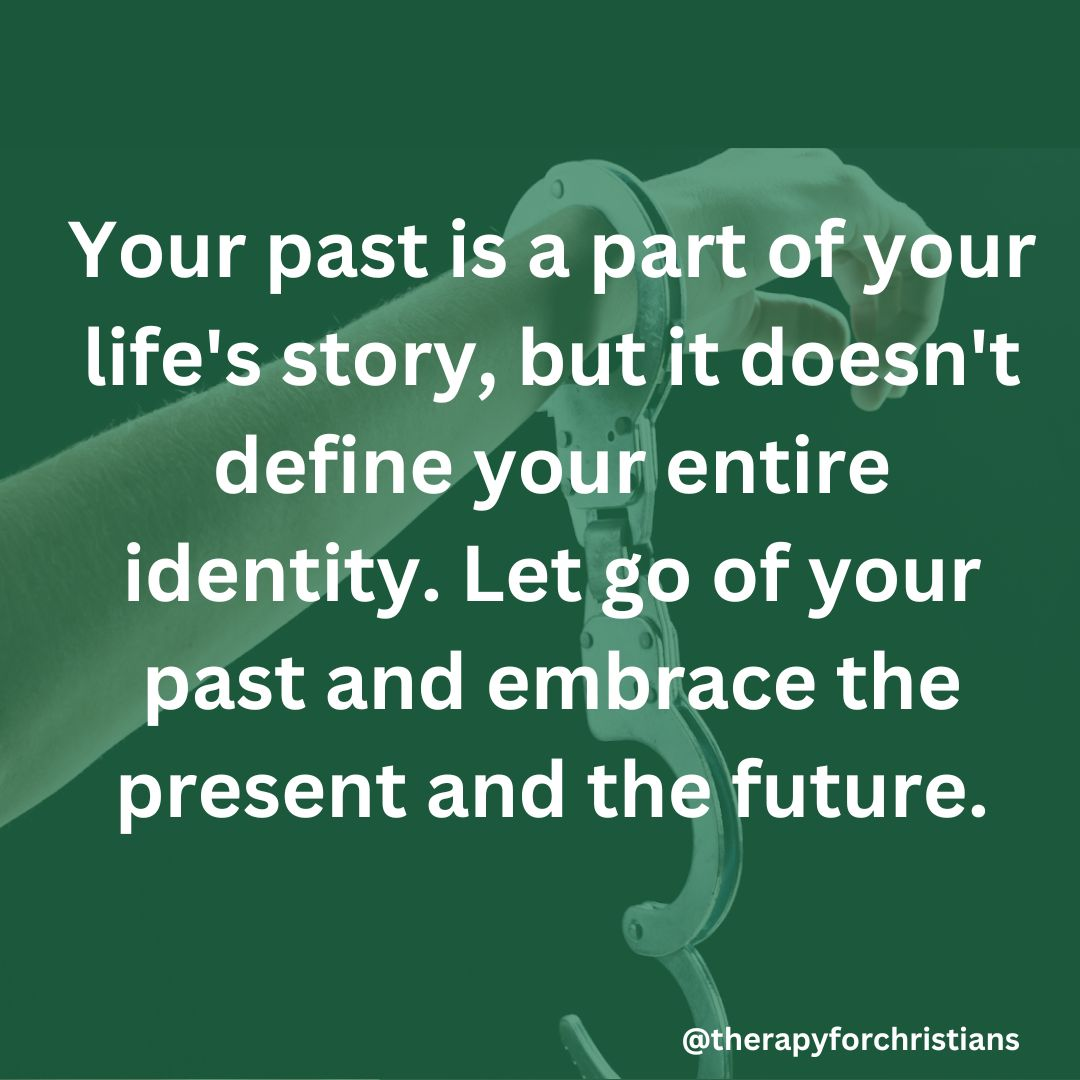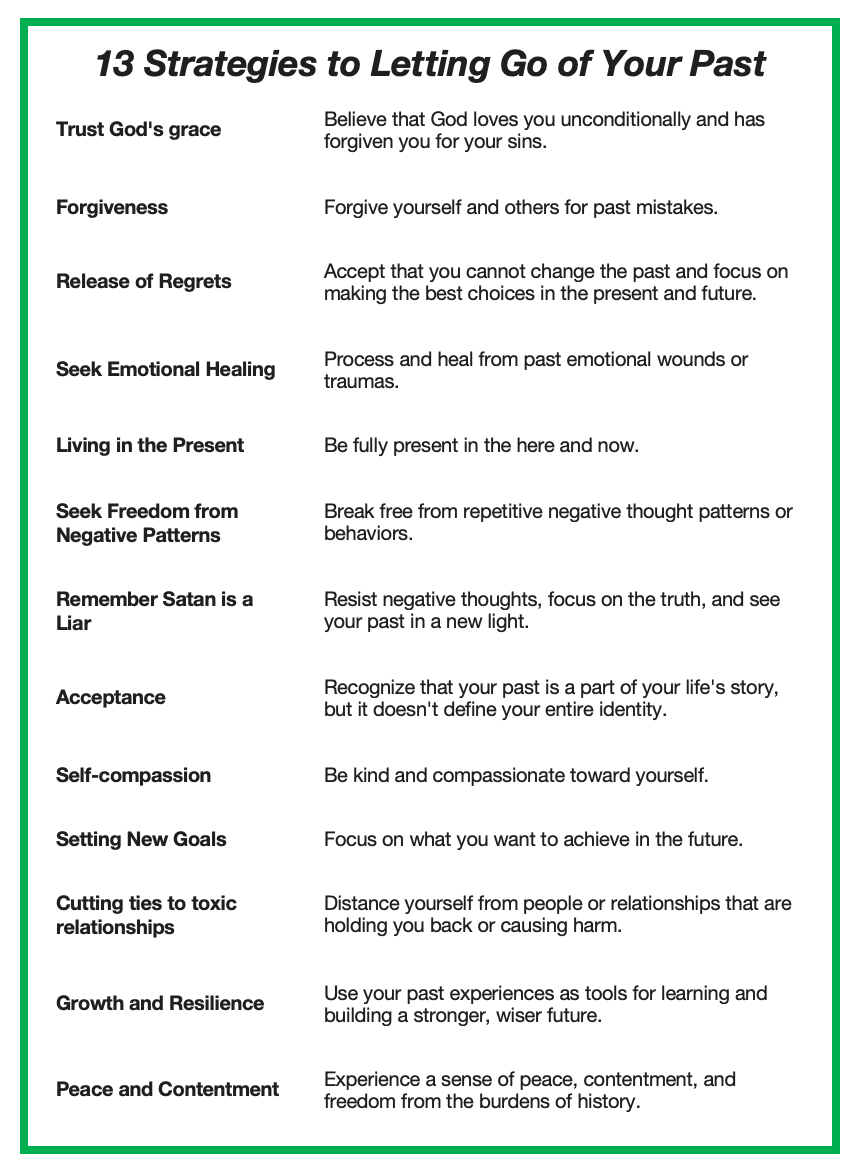
Have you done something in your past that you're not proud of? Do you wish you had a do-over in certain areas of your life? Is there a certain memory that makes you feel ashamed every single time it crosses your mind?
You are not alone, we've all been there. At some point in our lives, we have all done things we're not proud of. No one in this world can ever truthfully say they are perfect and have never made mistakes. We're human, not God, mistakes are inevitable.
If your mind has tricked you into believing that you are the worst person in the world, set yourself free today. Yes, you're a child of God, but you're also human, and what you did in the past is a mistake, a human error, not your identity.
This is why releasing yourself from your past is important. The fact is, if you stay stuck in your past it will be so much more difficult to move forward into the future. God will redeem your past but He needs you to let go of it first. Continue to read as we take a deep dive into letting go of the past.

Why is it Hard to Let Go of the Past?
Letting go of the past can be challenging for several reasons, as it often involves complex emotional and psychological processes. Here are some of the key reasons why it's hard to let go of the past:

Emotional Attachment: We become emotionally attached to our past experiences, especially if they were significant or emotionally charged. Positive memories can be a source of comfort, while negative ones can be a source of pain. This emotional attachment can make it difficult to let go.
Fear of the Unknown: The past is familiar, and the future is uncertain. Releasing past means stepping into the unknown, which can be intimidating and trigger anxiety.
Regrets and Guilt: Regrets over past decisions or actions and feelings of guilt can be powerful barriers to moving on. People often feel that they should have done things differently or made better choices, and these regrets can keep them anchored to the past.
Unresolved Trauma: Traumatic experiences can leave deep emotional pain and scars. Letting go may require addressing and healing from these traumas, which can be a daunting process.
Attachment to Identity: People often derive a sense of identity and self-worth from their past experiences. Letting go may require redefining one's sense of self and purpose.
Nostalgia: Nostalgia can be a powerful force, leading people to romanticize the past and resist change. It can be difficult to let go of the warm, comforting feelings associated with nostalgia.
Habitual Thinking: Overthinking and ruminating about the past can become a habit. Breaking this habit and redirecting thoughts toward the present and future can be challenging.
Loss and Grief: Letting go of the past can feel like a form of loss, even if it involves letting go of negative experiences. Grief can be a natural response to any form of loss.
Social and Cultural Influences: Society and culture often emphasize the importance of history and tradition, which can make people reluctant to let go of the past. This can be particularly pronounced in cultures that hold strong to their traditions.
Attachment to Material Possessions: Some people become emotionally attached to material possessions, which can represent memories or experiences from the past. Letting go of these possessions can be emotionally challenging.
Lack of Coping Skills: Some individuals may lack the coping skills or strategies to deal with the emotional challenges associated with letting go of the past. They may not know how to process and release their emotions.
Perceived Comfort in Victimhood: In some cases, individuals may hold onto their past as a way of maintaining a sense of victimhood or garnering sympathy from others.
Dependency on the Past: The past can serve as a source of stability or a reference point for people. Letting go may challenge one's sense of security.
Despite these challenges, it's important to work on letting go of the past, as holding onto it can hinder personal growth and well-being. This process often involves self-reflection, self-compassion, seeking support when needed, and a commitment to focusing on the present and future. 
Is It Possible to Completely Gorget What You've Done?
I don't think so. But is it possible to release it and set yourself free? Absolutely!
In 2 Corinthians 12:7-10, Paul tells us exactly how he did it:
"Three times I pleaded with the Lord to take it away from me. But he said to me, 'My grace is sufficient for you, for my power is made perfect in weakness.' Therefore I will boast all the more gladly about my weaknesses, so that Christ's power may rest on me."
Could the "thorn in his flesh" be Paul's past? Could it be the memories of his murders? Could all that he had done to the people who only believed the truth be the thing that was tormenting him?
I believe it's possible. After all, Paul was a persecutor of Christians before he was converted. He was responsible for the deaths of many innocent people. It's natural to think that his past would haunt him.
But Paul learned to trust God's grace. He realized that he didn't need to forget his past in order to be forgiven by God. He could simply accept God's forgiveness and move on.
Paul also learned to see his weaknesses as an opportunity for God's strength to be revealed. He realized that he was most dependent on God when he was weak.

How Can We Forget Our Past?
We can't forget it completely, but we can choose to focus on the present and the future. We can trust God's grace to forgive us and empower us to live a new life in Christ.
And we can remember that Satan is a liar. He will try to use our past against us, but we don't have to listen to him. We can choose to believe God's truth about us: that we are forgiven, loved, and accepted.
How do you defeat Satan? How do you deal with the thorn in your flesh?
The second part of the scripture gives us an answer to that.
What is Christ's power?
Christ’s power is the finished work on the cross, the blood that was shed for the forgiveness of your sins.
Through the power of Christ, you are forgiven and set free. Why then, are you holding yourself hostage to your past? Why do you hold on to the very things Jesus died for you to let go of? Your sins are forgiven, you have been redeemed.
"God may forgive your sins, but your nervous system won't." —Alfred Korzybski
Your flesh may be weak but your Spirit is strong. No matter what you've done and how many times you've done it, you can release it and you can let it go.
Your thoughts may remind you of it, people may remind you of it and just like Paul, there may be hardships and insults in your life too but press on.
Forgive them, forgive yourself, release forgiveness over and over again because you deserve a present and a future that is not held back by your past. You deserve healing.
For I will be merciful to their unrighteousness, and their sins and their lawless deeds I will remember no more. Hebrews 8:12
God is merciful and He is just. You've become a new person, a better person, He knows that and He honors that.
What Does it Mean to Let Go of Your Past?
Letting go of your past means releasing the emotional and psychological attachment to events, experiences, or circumstances that have happened in your life before the present moment. It involves freeing yourself from the negative influence of past memories, regrets, or traumas that may be holding you back from living a fulfilling and positive life.
Here are some key aspects of what it means to let go of your past:
Trust God's Grace
First, you trust God because His grace is sufficient for you, and His power is made perfect in your weakness. Instead of feeling ashamed of your past and letting it torment you, you release it all to Him. You don't hide who you were because who you’ve become is a testimony of God's strength and mercy.
You delight in your weakness because Christ's power rests on you.
Related: What Does Let Go and Let God Mean When You Have Mental Illness
Forgiveness
Letting go of the past often starts with forgiving yourself and others. It means acknowledging that people make mistakes and that holding onto grudges or self-blame can be detrimental to your well-being. Forgiveness is a way of freeing yourself from the emotional burden of past wrongs.
Release of Regrets
Regrets about past decisions or missed opportunities can be heavy burdens. Letting go of the past means accepting that you cannot change the past and focusing on making the best choices in the present and future.
Emotional Healing
It involves processing and healing from past emotional wounds or traumas. This might require therapy, counseling, or self-reflection to work through unresolved emotions and find closure.
Living in the Present
Letting go of the past means being fully present in the here and now. Dwelling on the past can prevent you from experiencing and enjoying the current moment.
Freedom from Negative Patterns
It involves breaking free from repetitive negative thought patterns or behaviors that are influenced by past experiences. These patterns can hold you back from personal growth and happiness.
Remember Satan is a Lair
Satan is a deceiver and a liar. He tries to lead us away from God and convince us that we are unworthy of forgiveness. Remembering that Satan is a liar can help us to resist negative thoughts, focus on the truth, and see our past in a new light. This can help us to let go of the past and live a new life in Christ.
Acceptance
Acceptance is a key part of letting go of the past. It means recognizing that your past is a part of your life's story, but it doesn't define your entire identity. You accept your past as a teacher, but not as a jailer.
Self-Compassion
Being kind and compassionate toward yourself is essential. Instead of self-criticism, self-compassion allows you to nurture your own well-being and self-esteem.
Setting New Goals
Part of moving forward is setting new goals and aspirations. It's about focusing on what you want to achieve in the future rather than dwelling on what has already occurred.
Cutting Ties to Toxic Relationships
Sometimes, letting go of the past involves distancing yourself from people or relationships that are holding you back or causing harm.
Growth and Resilience
Letting go of the past can lead to personal growth and increased resilience. It means using your past experiences as tools for learning and building a stronger, wiser future.
Peace and Contentment
Ultimately, letting go of the past aims to bring you a sense of peace, contentment, and freedom from the burdens of history, allowing you to fully embrace life in the present moment.
It's important to note that letting go of the past is a personal journey, and the process may vary from person to person. Some may find it beneficial to seek support from a therapist, counselor, or support group when working through their past. It's also a lifelong process as new experiences and challenges arise, and the ability to let go and move forward remains a valuable skill throughout life.
Final Thoughts on Letting Go of The Past
What you've done in your past may have been lawless, it may have been unrighteous, it may have been the biggest sin ever. Still, He remembers it no more. So do not dwell on what God has already forgotten, release it, and trust Him. There is no one exempt from a Saul to Paul transformation. You are better today than you were yesterday.
If you are struggling to let go of the past on your own, you may want to consider talking to a therapist. A therapist can help you to understand why you are ruminating and to develop strategies for coping with your thoughts. You can search our database of Christian therapist here: Find a Christian therapist near you.
Before you leave, we would appreciate it if you helped us spread the word by sharing, tweeting, pinning, etc. this post.
Bryson Bernarde is the author for Keep God in Life, a blog focused on providing helpful life tools to Christians to give them the strength, hope, and motivation to stick with Christ. As a lifelong entrepreneur who’s made it all and lost it all, Bryson pulls from his experience in struggles and hardship, understanding what it’s like to go from the very top to the bottom, quickly. This ignited his newfound focus on helping others to not lose faith as they climb to get to where they want to be in life.
Help us increase mental health awareness in the Christian community by donating through our paypal link here: www.paypal.com/therapyforchristians, joining our mailing list by clicking below, or join our provider list here: Provider listing
Disclaimer: the information, including but not limited to, text, graphics, images and other material contained on this article are for informational purposes only. No material on this site is intended to be a substitute for professional medical advice, diagnosis or treatment. If you are looking for a Christian counselor near you, please check out our directory located here: Christians Therapist Near Me
Featured Christian Therapists
Specialty Psychiatrist or Nurse Practiti... Located in Virginia Beach, VA
View Listing.png)
















